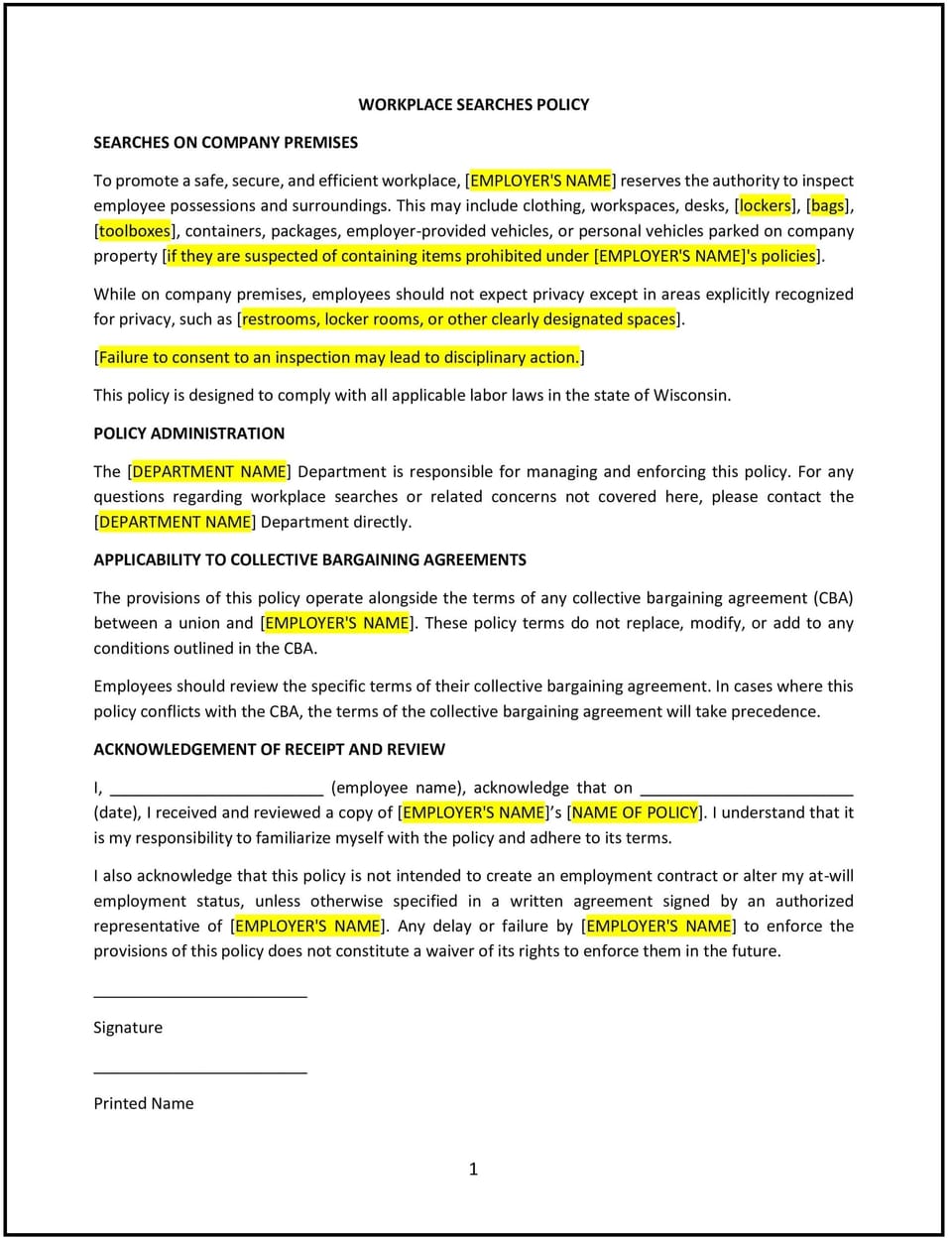Workplace searches policy (Wisconsin): Free template

Workplace searches policy (Wisconsin)
In Wisconsin, a workplace searches policy provides guidelines for conducting searches of company property, workspaces, or personal items on company premises. This policy helps businesses maintain workplace safety, security, and compliance while respecting employees’ privacy rights. It establishes clear expectations for when and how searches may be conducted to prevent disputes or misunderstandings.
This policy outlines the employer’s rights, the procedures for conducting searches, and the types of property subject to searches.
How to use this workplace searches policy (Wisconsin)
- Define the scope: Clearly specify the types of property subject to searches, such as desks, lockers, computers, or personal belongings brought onto company premises.
- Outline conditions for searches: Explain the circumstances under which searches may be conducted, such as during investigations of theft, safety concerns, or policy violations.
- Establish procedures: Provide clear steps for conducting searches, including notification requirements, consent procedures, and documentation of findings.
- Communicate employee rights: Inform employees of their rights and responsibilities regarding workplace searches to ensure transparency.
- Support compliance: Align the policy with Wisconsin state laws and federal regulations, promoting legal adherence and respect for privacy rights.
Benefits of using a workplace searches policy (Wisconsin)
- Enhances security: Deters theft, unauthorized use of company property, and other security risks by establishing clear search protocols.
- Supports compliance: Improves adherence to Wisconsin state laws and federal regulations governing workplace searches.
- Promotes transparency: Provides employees with clear information about their rights and the company’s authority to conduct searches.
- Protects company assets: Helps safeguard company property and sensitive information from misuse or theft.
- Reduces disputes: Minimizes misunderstandings and potential conflicts by defining clear procedures for workplace searches.
Tips for using a workplace searches policy (Wisconsin)
- Communicate the policy: Share the policy with employees during onboarding and ensure it is accessible for future reference.
- Train supervisors: Provide training for managers on how to conduct searches lawfully and respectfully.
- Maintain documentation: Keep detailed records of all searches conducted, including the reasons, methods, and outcomes, to ensure accountability.
- Balance privacy and security: Ensure searches are conducted only when necessary and are consistent with the policy to avoid infringing on employees’ rights.
- Review regularly: Update the policy to reflect changes in Wisconsin laws, workplace needs, or industry standards.
Q: What types of property can be searched under this policy?
A: Property subject to searches may include company-provided desks, lockers, vehicles, computers, and personal items brought onto company premises, as specified in the policy.
Q: Under what circumstances can a search be conducted?
A: Searches may be conducted when there is a legitimate reason, such as investigating theft, ensuring safety, or addressing suspected policy violations.
Q: Are employees notified before a search is conducted?
A: Notification requirements depend on the specific situation and company policy. The policy should clarify whether searches can occur with or without prior notice.
Q: How does this policy comply with Wisconsin laws?
A: The policy aligns with Wisconsin state laws and federal regulations, ensuring that workplace searches are conducted lawfully and respectfully.
Q: What happens if an employee refuses to consent to a search?
A: The policy should outline the consequences for refusing a search, which may include disciplinary actions depending on the circumstances.
This article contains general legal information and does not contain legal advice. Cobrief is not a law firm or a substitute for an attorney or law firm. The law is complex and changes often. For legal advice, please ask a lawyer.


